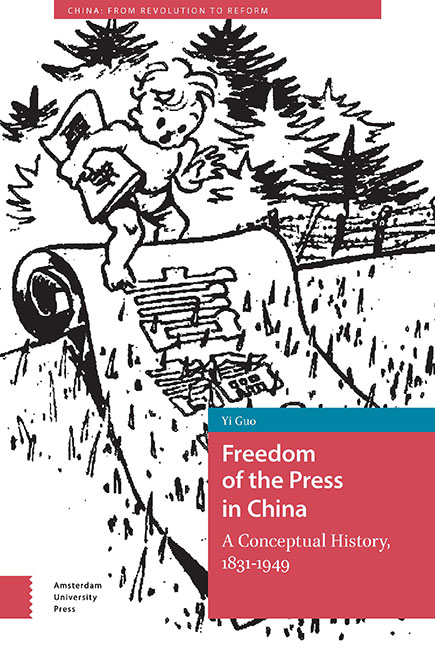Book contents
- Frontmater
- Contents
- A Note on Romanization
- Acknowledgements
- Foreword
- Introduction
- 1 The Enlightenment of the West
- 2 Chuban Ziyou: The Invention of a Neologism
- 3 The Liminal Landscape
- 4 The Intellectual Legacy of Sun Yat-sen
- 5 The Empty Phrase and Popular Ignorance
- 6 Conceptual Debates in the 1920s and 1930s
- 7 The Last Call for Press Freedom
- Conclusion
- Bibliography
- Index
- Frontmater
- Contents
- A Note on Romanization
- Acknowledgements
- Foreword
- Introduction
- 1 The Enlightenment of the West
- 2 Chuban Ziyou: The Invention of a Neologism
- 3 The Liminal Landscape
- 4 The Intellectual Legacy of Sun Yat-sen
- 5 The Empty Phrase and Popular Ignorance
- 6 Conceptual Debates in the 1920s and 1930s
- 7 The Last Call for Press Freedom
- Conclusion
- Bibliography
- Index
Summary
Abstract
Ever since the concept of press freedom was first introduced into China during the late-Qing dynasty, Chinese perceptions of the function of a free press have frequently changed. This research has shown that the social and cultural context shaped the unique interpretations of press freedom in China and impacted the extent to which it was realized in modern Chinese history. There were numerous problems that permeated the history of press freedom in China, problems that continue to influence the experience of press freedom in China today. This chapter concludes by exploring the theoretical and contemporary implications of the conceptual history of press freedom in China.
Keywords: political reform, Maoist era, freedom of speech, media control, press censorship
Even though the Chinese system of writing had been invented as early as the fourteenth century BCE, the right to press freedom had never developed in imperial China. The arrival of this modern concept from the outside reflected China's encounter with the Western Enlightenment, and as such it is a meaningful topic relating to transcultural knowledge transfer and human freedom in China. This book has focused on the transcultural transfer and development of the concept of press freedom in modern China. During the 110 years from the 1830s to 1940s, China was forced to fight for its survival as a nation due to unexpected international aggressions and wars. It then successively experienced a bourgeois revolution and a communist revolution as a result of increasingly severe social crises. China was involved twice in world wars, and the Second World War led to almost complete exhaustion. The concept of press freedom thus had to develop alongside drastic social change and the pains and ignomony inflicted on both people and nation by recurring conflicts and crises.
The history of press freedom in China saw the introduction of the free press to late-Qing-era intellectuals during the early years of the Republic and later the influence of the Nationalist Party's conservative news policy; yet it came to a premature end in the middle of the twentieth century. In later decades, the Western concept of press freedom would be entirely denied and criticized by Chinese authorities.
- Type
- Chapter
- Information
- Freedom of the Press in ChinaA Conceptual History, 1831–1949, pp. 211 - 230Publisher: Amsterdam University PressPrint publication year: 2020



